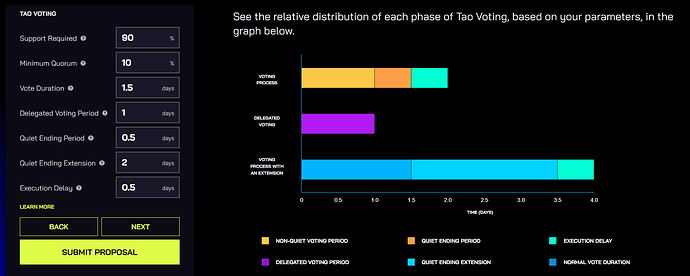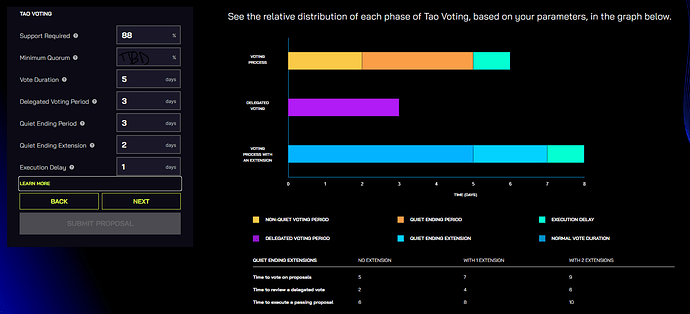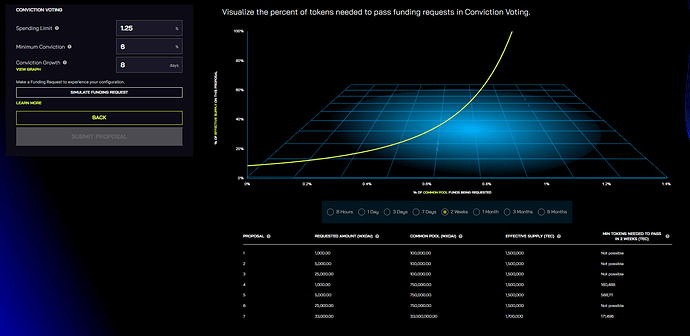GIVgarden Parameters Revised (A Technocratic Story)
Alright team, thanks to the Commons Configuration Dashboard, the TEC Param parties, and our friends at 1Hive and BrightID we’ve learned a great deal about parameterizing Tao Voting and Conviction Voting for our GIVgarden.
@mitch @Griff and I have collaborated and to the best of our ability come up with a new proposal for our GIVgarden parameters. The parameters and their explanation shall be outlined below:
Tao Voting Fundamental Strategy:
Tao Voting is the decision making process that governs proposals to make changes to the GIVgarden. It can change garden parameters, it can change the rewards program for GIV stakers on xDai, it can send the funds from the GIVgarden common pool (33% of the total supply of GIV) anywhere & more!
We are proposing to launch the GIVgarden & our token with an initial set of parameters that allows our team to pass Tao Votes quickly in case we need to put out any fires (like change the rewards contract for the garden or make any quick changes to the Conviction Voting settings). Bearing in mind that our GIVdrop is going a “trusted seed” of Giveth donors, users & friends, it should be relatively easy to mobilize the crew to pass proposals to make changes in the early days with these settings. We chose to start with 10% minimum quorum (relatively easy to achieve with our trusted seed) and a high support required because people may be wrapping tokens and not voting (i.e. staking in the 100% GIV staking pool in the GIVfarm on xDai). The settings are in the spreadsheet below, and also summarized here:
After about 2 weeks, we intend to pass a decision vote (very feasible with our trusted seed) to change these settings to the ones we want to maintain (after putting out initial launch fires). The Minimum Quorum is “TBD” because we intend to see what percentage of the initial liquid supply that people decided to wrap (and therefore have count towards the “total supply” for the GIVgarden). This quorum includes tokens wrapped in the garden & voting on proposals AND tokens that are staked in the xDai GIV staking pool in our GIVfarm UI (even if they are not voting).
Conviction Voting Fundamental Strategy
Conviction Voting is the decision making that rules funding proposals made in the GIVgarden. As outlined in the Covent feedback post these settings govern the way GIV token holders can vote on and pass proposals requesting funds from the GIVgarden common pool (at launch, containing 33% of the total supply of GIV).
Our params were chosen with the following in mind:
-
Conviction Growth: In general, a voter’s conviction roughly maximizes after staking tokens for 4 x conviction grown (days) - we set a conviction growth of 8 days… so conviction maxes out and begins to plateau around 1 month. Proposals sitting for longer than that without additional support get kind of stale.
-
BrightID currently has an effective supply of 12% of their total. Our economy will be of a similar scale, so we use them as a reference. We assume an effective supply between 0.5 million to 1.7 million GIV (up to ~10% of the liquid GIVdrop amount, and the amount of tokens that we could mobilize and get in the GIVgarden if necessary). A higher effective supply than this would just make it harder for proposals to pass, so this is a good estimate as a minimum.
-
Spending limit: We wanted to maximize it, but in the end, there is about 33 million tokens liquid in the common pool initially and 17 million liquid tokens in circulation at launch (doing anything). We set the spending limit is to 1.25% to ensure that no proposal can pass with less GIV voting on it than it is requesting.
-
Note that, the GIVgarden common pool has a GIVstream (so 90% of it total allocation of tokens is being streamed). The circulating supply of GIV is increasing at a higher rate than the tokens being streamed to the GIVgarden common pool (because it is coming from GIVfarm rewards, GIVbacks rewards, salaries being paid out from the rGIV DAO, etc.). We intend to adjust the spending limit as the proportions of liquid tokens change.
-
We chose these params and simulated outcomes for a proposal of 33,000 GIV (valuing $3300 if GIV is $0.10) which is requesting only 0.1% of the Common Pool at launch (33,000,000 GIV). Assuming the effective supply if 1,700,000 GIV (as above)… this small proposal would be impossible to pass in 8 hours. In 3 days, to pass, it would need about 25% of the effective supply voting on it. In 1 week, 15%… in 2 weeks, 8%… in 1 month about 7% and it plateaus. You can play with simulating different outcomes for different funding requests by playing with the dashboard here.
You can see a screenshot of these params and simulation for 2 weeks here:
Essentially these CV params were chosen to make it relatively easy/feasible to pass small proposals but we’re not giving away the farm in any one proposal. We’re also mitigating the fact that we have no idea what the GIV token price will be at launch. Remember also that we set Tao Voting params to make it relatively easy to update these if there are any surpirses immediately after launch.
The param are also in this spreadsheet:
In conclusion
The Giveth technocracy is satisfied with these as a jumping off point, but are also happy to get your feedback! Please leave any comments here. If there’s no real feedback by Friday, we’ll call this done.



